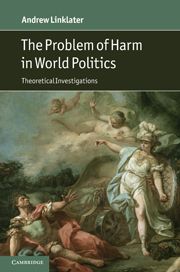Book contents
- Frontmatter
- Contents
- Preface
- Introduction
- 1 The concept of harm
- 2 The harm principle and global ethics
- 3 Harm and international relations theory
- 4 The sociology of civilizing processes
- 5 Historical sociology and world politics: structures, norms and emotions
- 6 Civilizing processes and international systems
- Conclusion
- Bibliography
- Index
Conclusion
Published online by Cambridge University Press: 05 June 2012
- Frontmatter
- Contents
- Preface
- Introduction
- 1 The concept of harm
- 2 The harm principle and global ethics
- 3 Harm and international relations theory
- 4 The sociology of civilizing processes
- 5 Historical sociology and world politics: structures, norms and emotions
- 6 Civilizing processes and international systems
- Conclusion
- Bibliography
- Index
Summary
The case has been made for a sociology of global civilizing processes that analyses how far a cosmopolitan harm principle was embedded in the normative structure of different states-systems. Societies of states have central importance because they are the highest ‘steering mechanisms’ available to independent political communities grappling with the challenges of interconnectedness. They are arenas in which the capacity to solve the problems associated with the ambiguities of interconnectedness has been put to the test; domains where societies have faced pressures to become attuned to each other (unless one is so dominant that it can effectively ignore the rest), and where they have discovered the extent of their capacity to become detached from parochial codes and to think from the other's standpoint; spheres in which, assuming a rough equilibrium of power, communities reveal how far they can observe self-restraint given the fear of disturbing the order on which all depend and, finally, in which they have demonstrated the extent to which they can widen the scope of emotional identification and support cosmopolitan principles that protect all people from the harms to which they are vulnerable. The modern states-system merits particular attention because it is the first form of world political organization that encompasses humanity as a whole. Whether it is, or can become, the site for unique civilizing processes that rein in the power to harm therefore has immense significance for the coming phase of global integration.
- Type
- Chapter
- Information
- The Problem of Harm in World PoliticsTheoretical Investigations, pp. 258 - 266Publisher: Cambridge University PressPrint publication year: 2011



